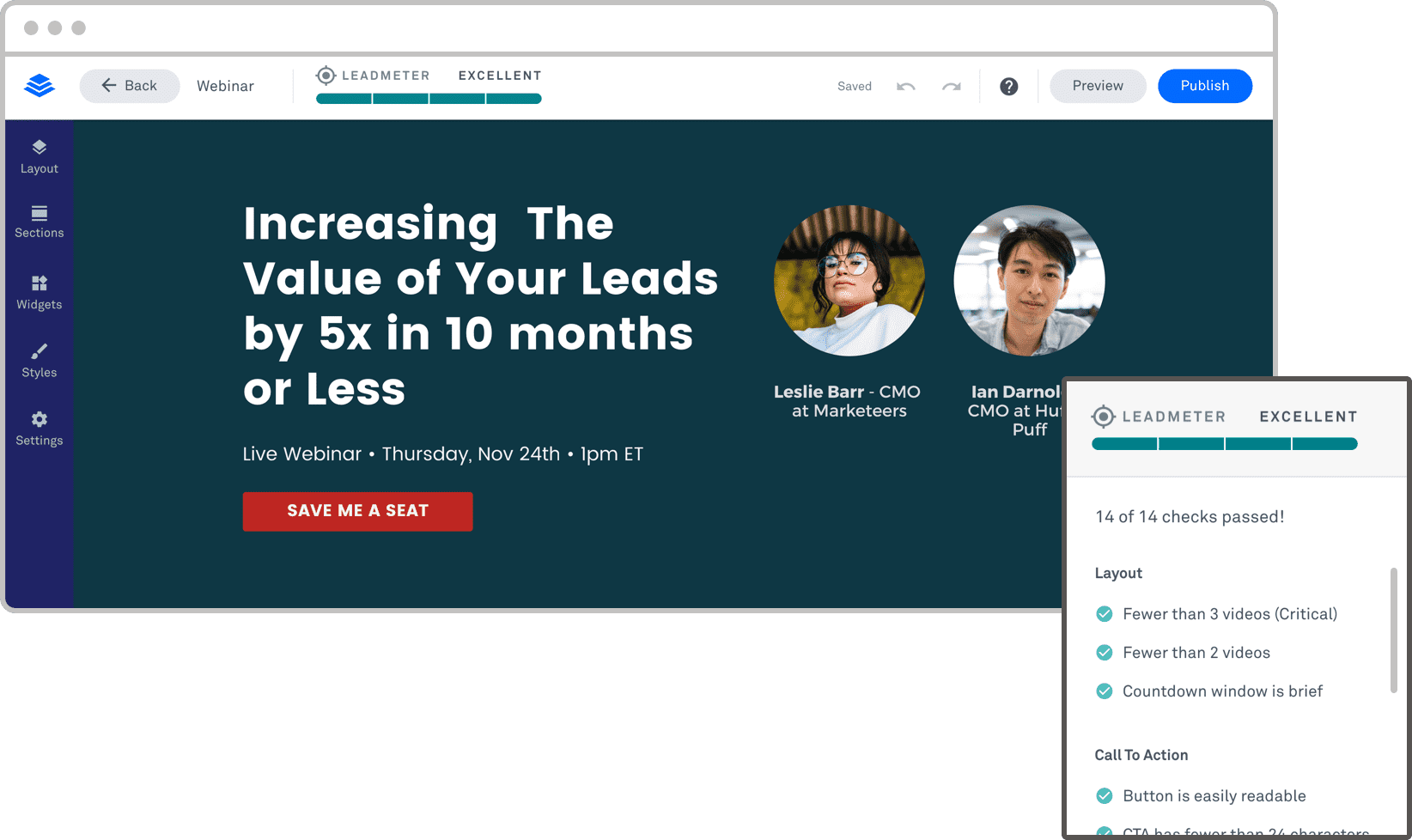Are you pondering creating a landing page to generate more leads, spread the news about an upcoming event, or start a sales funnel? Leadpages and Kajabi are two notable options to review.
But how do you decide? How does Leadpages stack up against Kajabi? As two major movers and shakers in the conversion marketing platform industry, this comparison gives a no-holds-barred look at both platforms.
This comparison gives you an unbiased and detailed look at each platform so you can select the best option for your business. We want you to succeed… Even if that means picking a platform other than ourselves.
As we compare Leadpages and Kajabi, we’ll take into account seven major criteria we believe are the most important to you when deciding between conversion marketing platforms.
While we’ll dive into a deep comparison of Kajabi vs. Leadpages, know that with both platforms, you can intuitively design and optimize landing pages. Yet, they are designed for two different “animals”. Kajabi narrows in on course creation and membership website tools, whereas Leadpages is focussed on building high converting landing pages and websites.
Sure, you get many of the same features and tools across both services, but let’s dive into which one is best suited for your needs. Dig in!
1 - Ease of Use:
The building experience
Leadpages:
Leadpages is designed for people of all web abilities to be able to easily publish a page on day one in very few steps, thanks to the user-intuitive tools within our platform.
In fact, Leadpages was created for the busy entrepreneur in mind:someone who wants to create an impactful online presence and create a sales funnel in as few clicks as possible.
Here are a few features that help users, like you, flourish with minimal effort:
Our drag-and-drop builder:
The drag-and-drop editor is constructed by rows and columns, which is intuitive, straight-forward, and ideal for non-web designers.
The Leadmeter:
Especially handy for users new to conversion tools, our (exclusive) Leadmeterpredicts how well your landing page will perform before you publish it. Then, it offers suggestions on what to tweak. This means better optimization of every element, from text and images to page layout and opt-in forms, in order to maximize customer actions on your page.
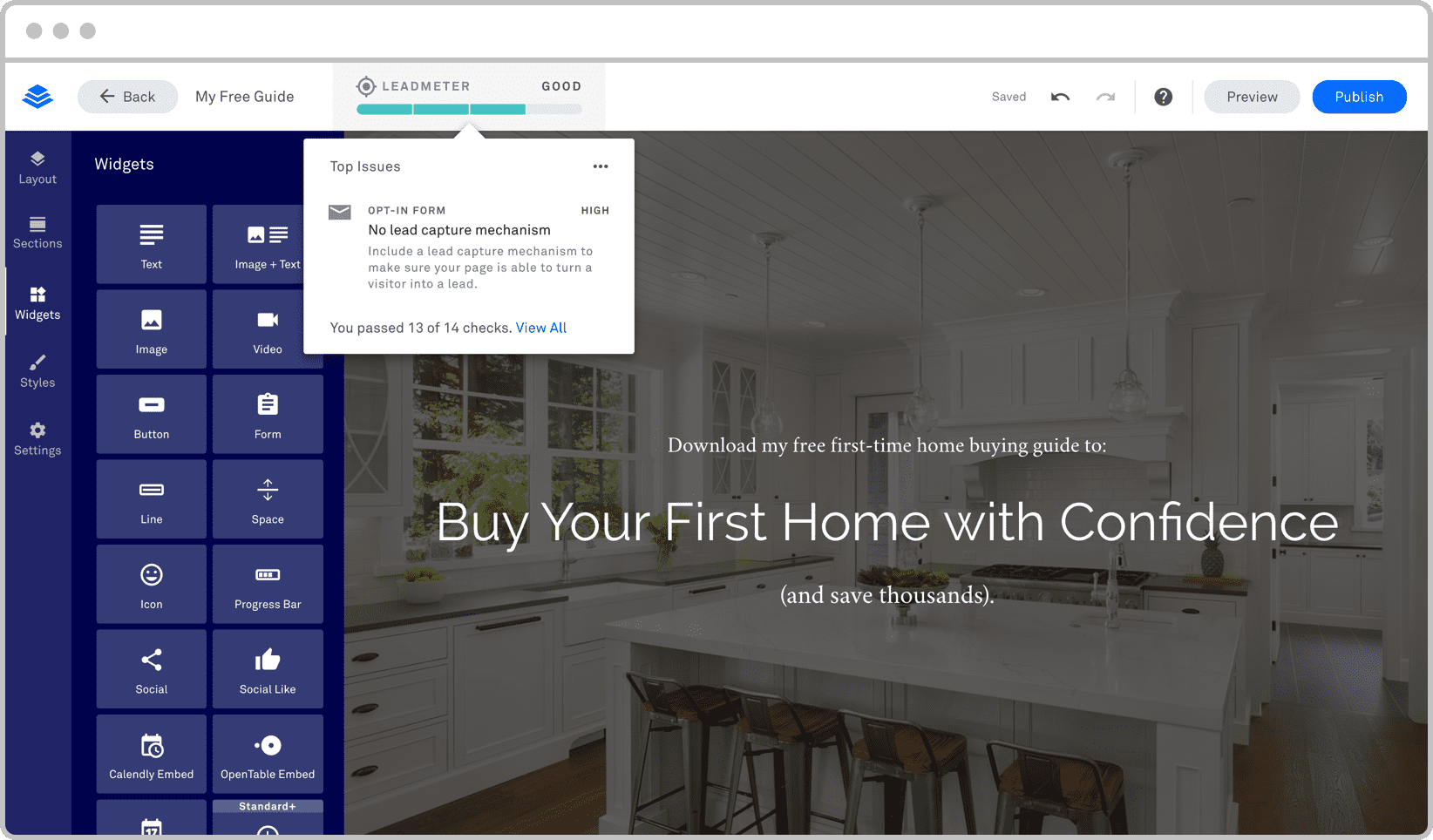
HTML widget:
Want a little more design freedom? While you don’t technically need to touch a line of code, more experienced designers can customize their page using our HTML widget and CSS customizations.
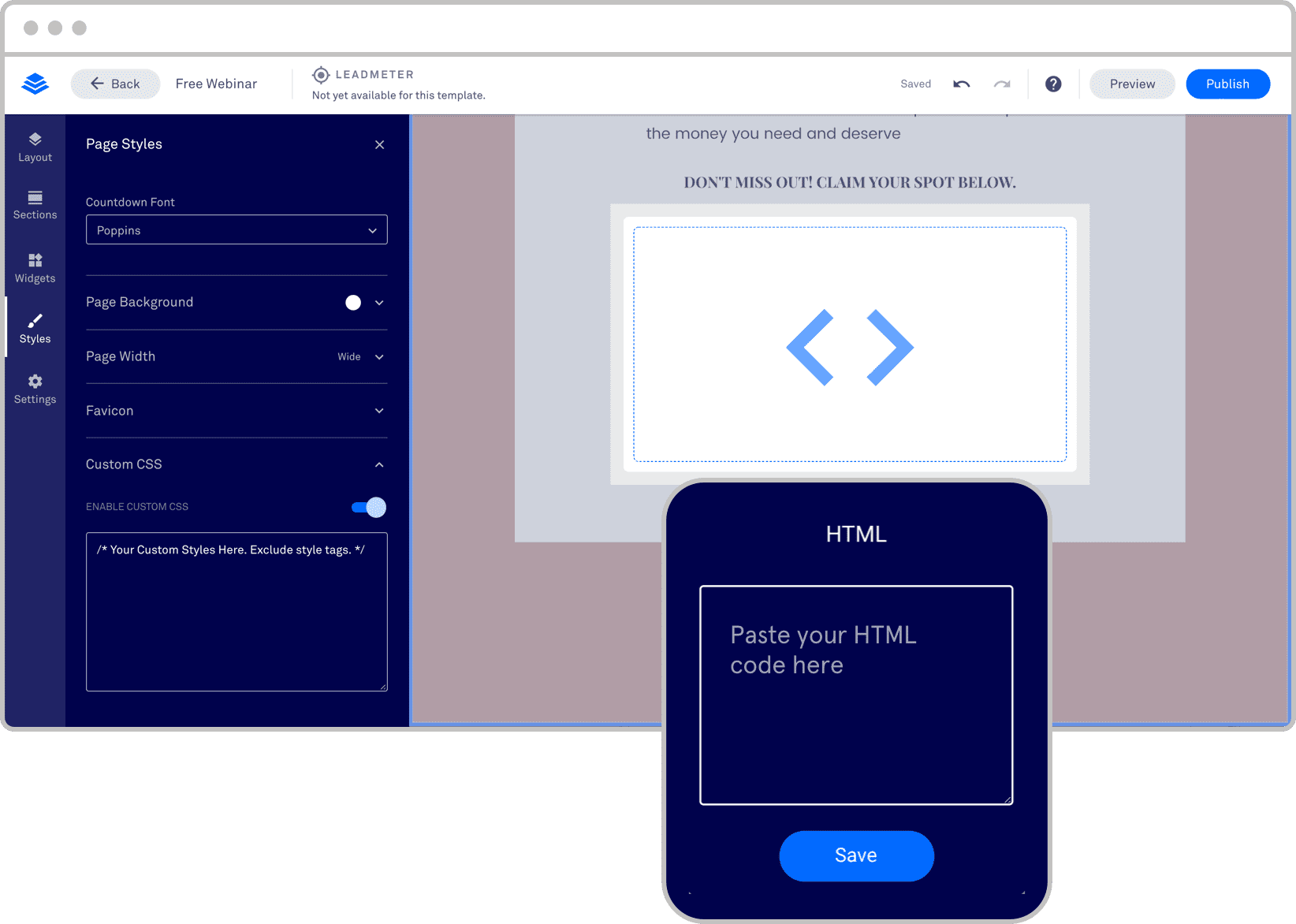
Copy/paste sections:
Avoid any hassle by copying and pasting sections. This feature ensures a cohesive design, all while saving time (and your work).
Automatic saving:
Never fret that you’ll lose work without saving.
Kajabi:
Now, onto Kajabi’s user experience… Do you want to know how Kajabi stacks up to Leadpages in terms of ease of use?
Like Leadpages, Kajabi offers a drag-and-drop building experience. Kajabi’s drag-and-drop builder, available from its sidebar, ensures a simple ease of use for any type of user. So, users don’t have to rely on code… Just its handy drag-and-drop tool. But given its wider range of focuses (courses, membership sites, etc.) it’s somewhat less streamlined and the building experience slightly less intuitive for the small biz owner just starting out.
Kajabi’s drag-and-drop editor is more limited, as it only lets you drag and reorder the sections on the side of its editor, rather by clicking the actual elements itself. Frankly, this system is a lot less intuitive and takes some time to get used to.
Verdict:
We win in this category. Our drag-and-drop, grid-based builder is ultra-intuitive and easy to use; all while maintaining your ability to be creative. We aid your design process by showing you where your widgets can go on your page, if you are craving extra guidance.
Kajabi’s drag-and-drop editor’s limitations with reordering and intuitiveness are also a downfall.
The Leadmeter is also a crucial benefit to maximizing conversions and ensuring your page is optimally designed from the get-go, which saves you a ton of time and guesswork.
Where Leadpages and Kajabi line up is here… Both builders display a “what you see is what you get” layout. (Yet, the flexibility of our editor provides a more seamless experience with resizing and placement.) Also, code is not required for either service, but HTML and CSS customization is supported for those wanting more control over their page.
2 - Functionality: features, widgets & integrations
Us:
Leadpages flawlessly integrates with more than 90 online marketing tools (and counting) to help fuel your business’s success in a range of areas.
Here’s a quick rundown of our features, widgets, and integrations:
Integrations:
We play well with all major email service providers (ESPs), customer relationship management tools (CRMs), webinar platforms, and social networks. Here’s how our integrations break down:
- Native: 21
- Compatible: 36
- Third-party: 33
- 2000+ integrations available via Zapier
- (SalesForce, HubSpot and Marketo integrations only available in advanced plans.)
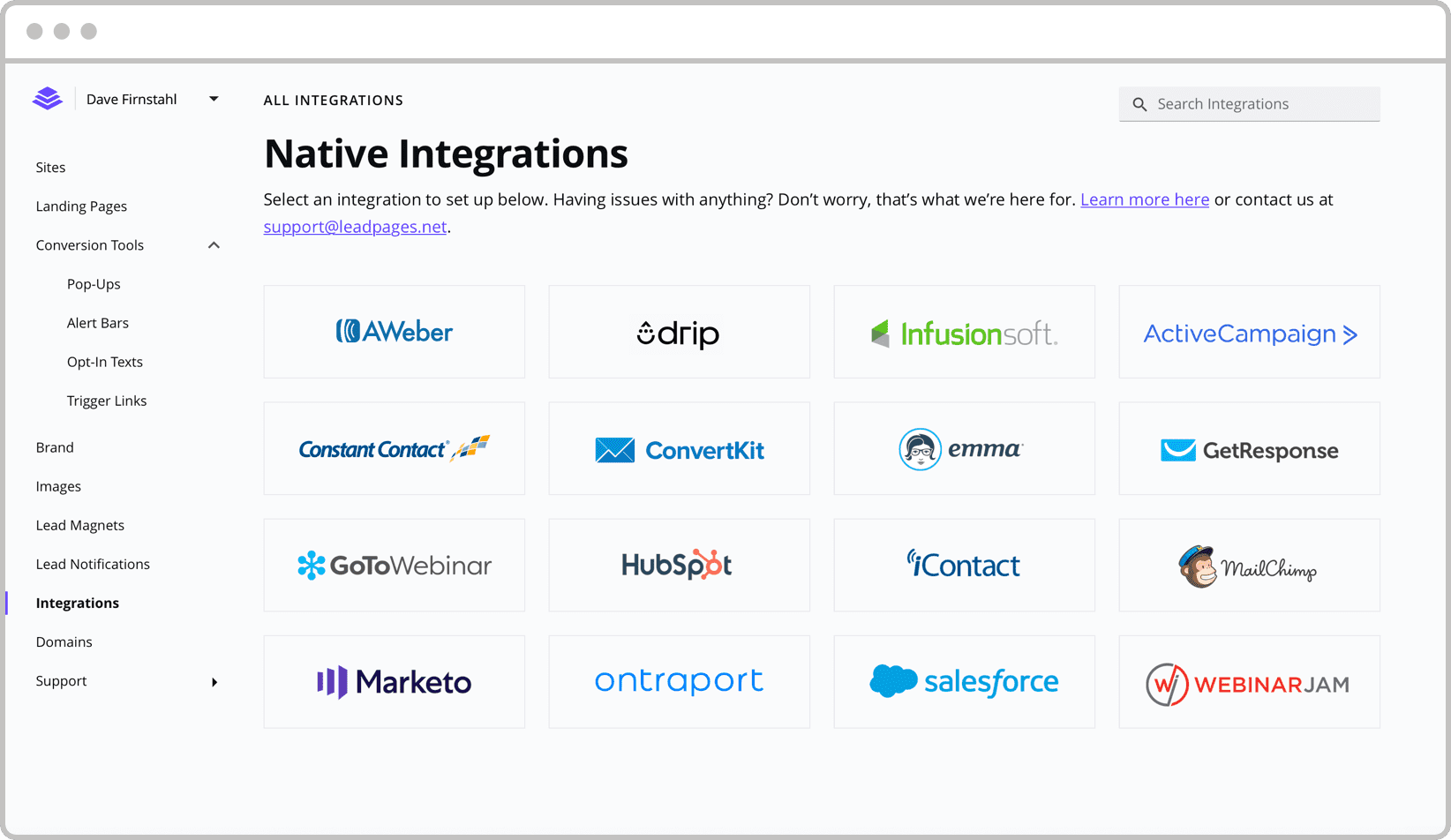
Option for CSS (customization):
If you’re looking to personalize your page’s integrations, look no further than Leadpages. Developers can customize via CSS.
Capture sales:
We offer integrated sales and checkout pages and payment via Stripe, so you can easily sell online products and services.
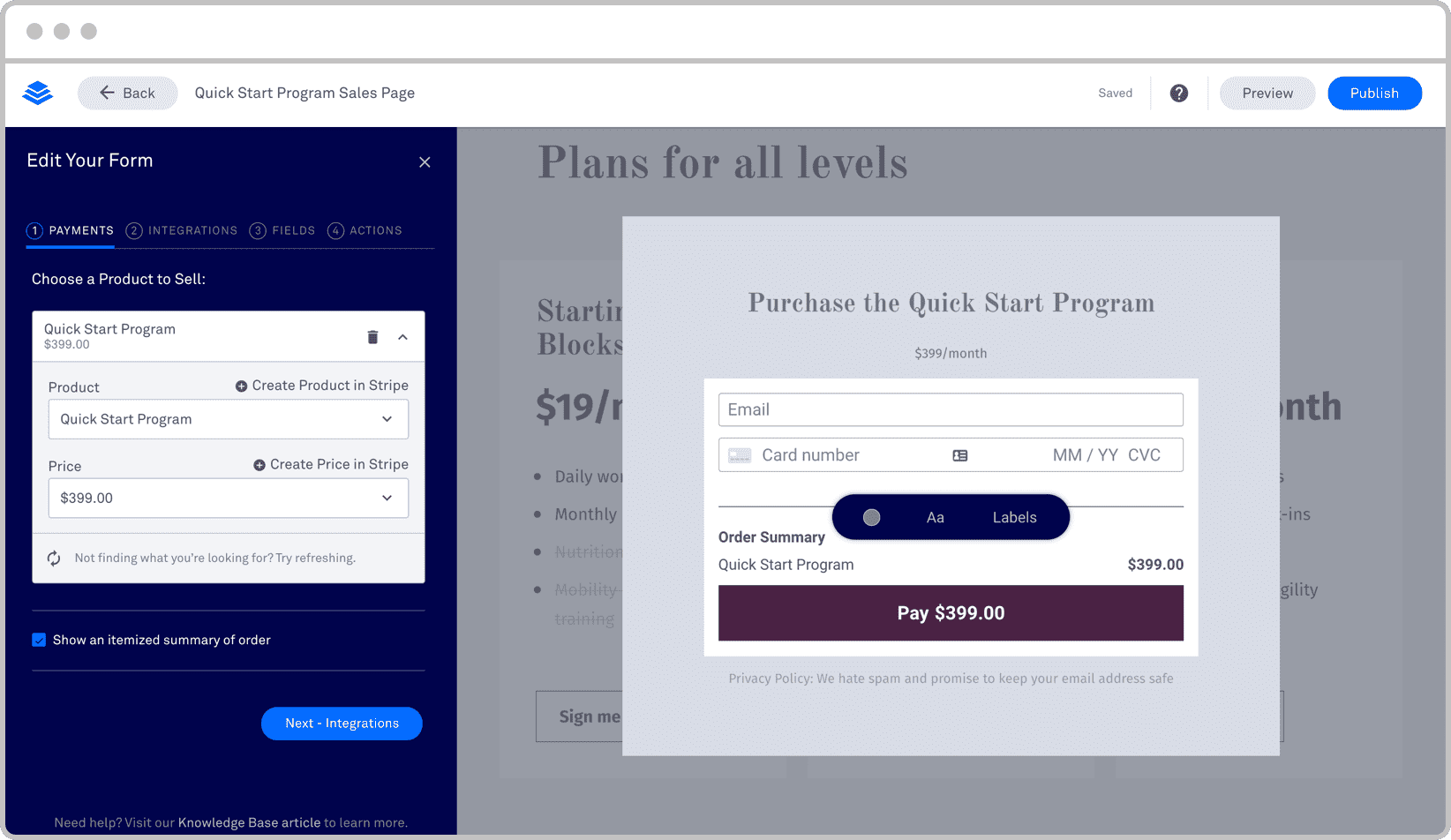
Widget availability:
Leadpages has 18 available widgets.
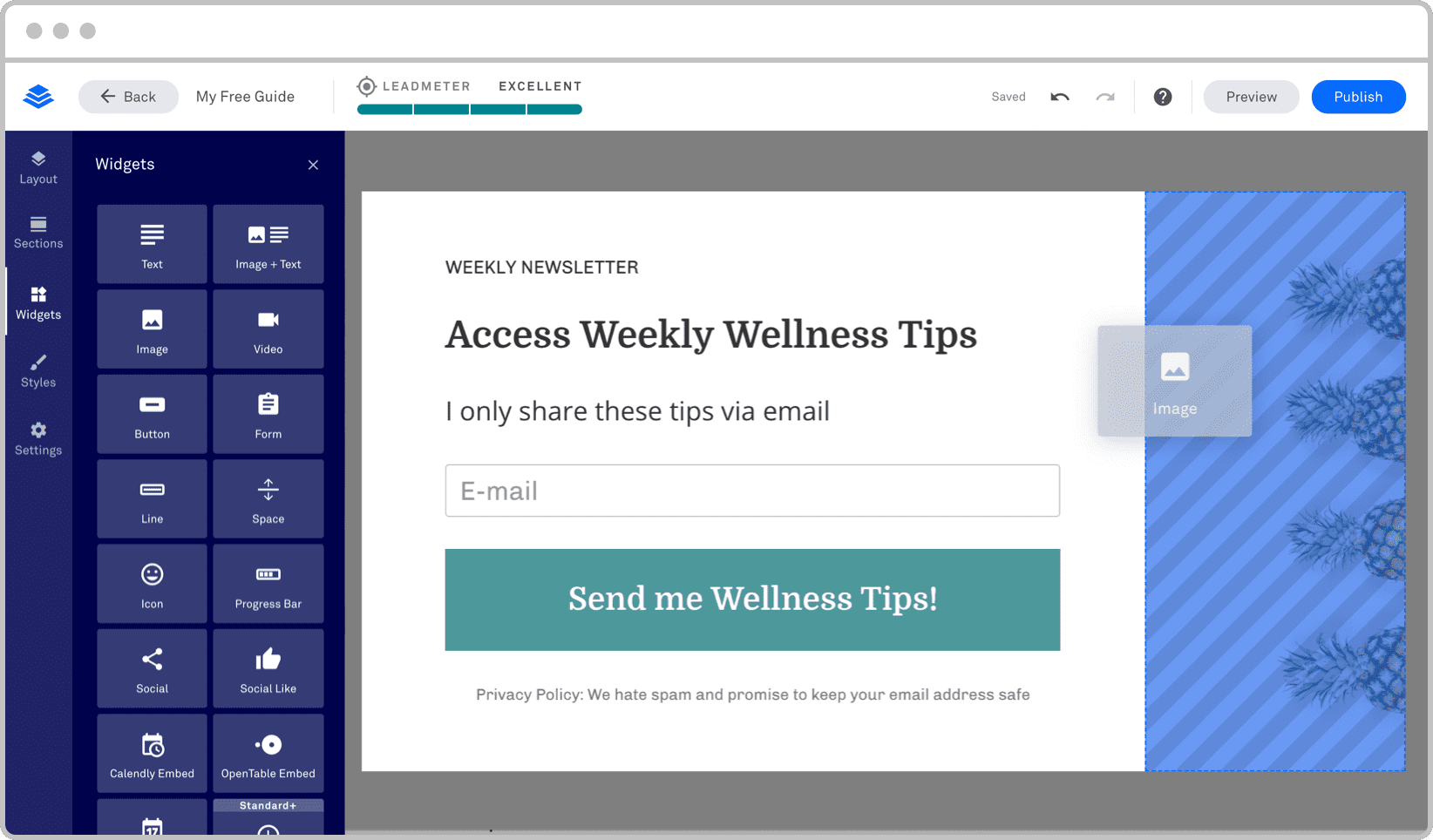
Email tagging:
Easily manage your email list with email tagging through AWeber, so you avoid the hassle of a disorganized list.
Self-scheduling via Calendly:
We make it easy to add your schedule to any page or pop-up using the natively integrated tool, Calendly. Let users easily snatch up open meeting times or appointments!
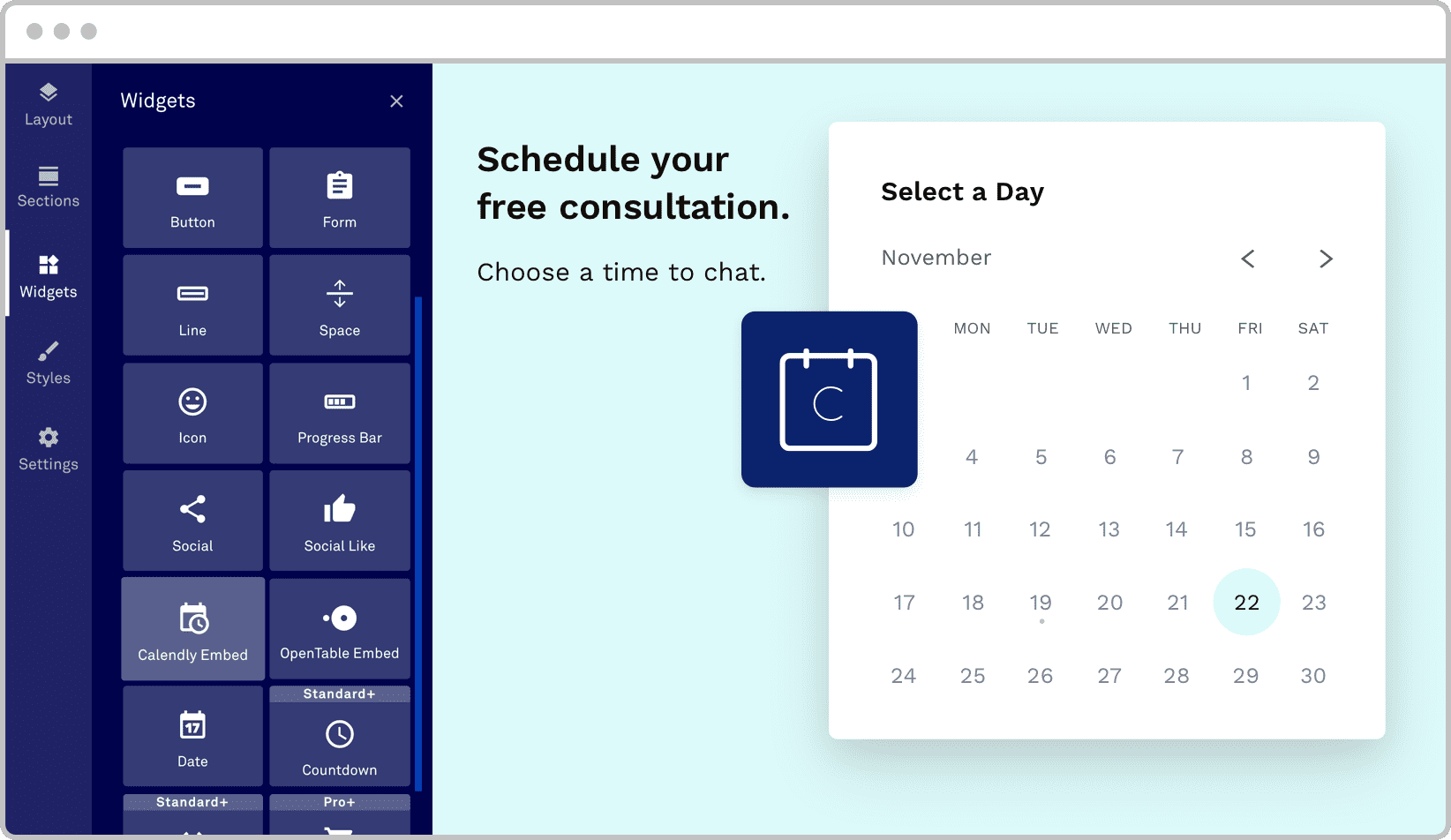
Online reservations via OpenTable:
Is your business a restaurant or bar? Our native integration with OpenTable allows your customers to search available reservation times and book a table right from your landing page or website.
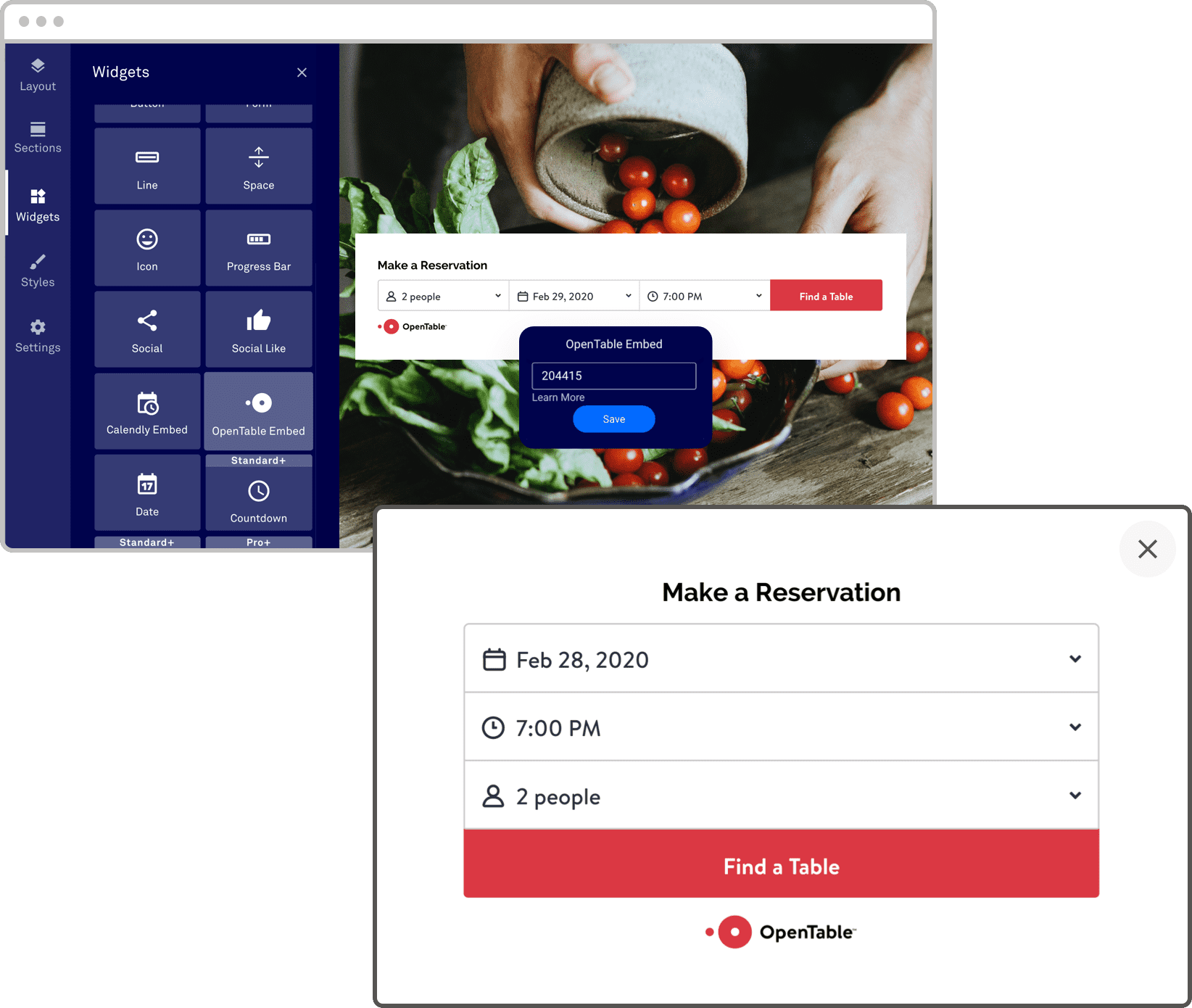
Kajabi:
Kajabi allows you to set up payment directly through Stripe or Paypal, so you can easily capture sales directly from your landing page. It also offers multiple integrations through Zapier. Its 43 widgets are divided into sections such as:
- Basic content
- Hero
- Features
- Marketing and events
- Images
- Videos
- Offers and pricing
- FAQS
- Testimonials
- Social
- Custom
Verdict:
In this category, it’s a tie… And the winner really is specific to your unique use case.
For instance, Kajabi offers their own email, campaign automation, social community, and lead tracking services. That being said, if you want to integrate with popular ESPs, CRMs, webinar platforms, or more than what Kajabi offers, then you must work through Zapier.
Where we flourish is our larger selection of built-in integrations with the apps you already know and trust, so you never have to work through a third party to get them or work with a custom solution that binds you to a single platform.
However, as far as widgets go, both Leadpages and Kajabi offer a large selection of elements you can add to your page, as well as supporting HTML customization.
3 - Look & feel: templates & customizability
Us:
Your design experience with Leadpages is easy. Create the look and feel that suits your industry and business, with little effort on your end. Here’s what we mean:
- Ease of use is our M.O.: Your page design can be as simple or as complex as your heart desires.
- A polished and pro-looking page: Fool your visitors with our highly professional pages. In fact, they won’t even be able to tell the difference between Leadpages-designed pages and agency-designed pages with a price tag of $20,000+.
- Conversions in mind: We’re the experts in conversion marketing so you don’t have to be. We take care in polishing our templates and designs to make sure they convert for your business. In fact, we conversion-optimize each element to make sure you’ve got the highest conversion rate possible.
Our templates are built to convert. With an abundance of template choices, you can feel confident in your page design, even if you have little to no experience.
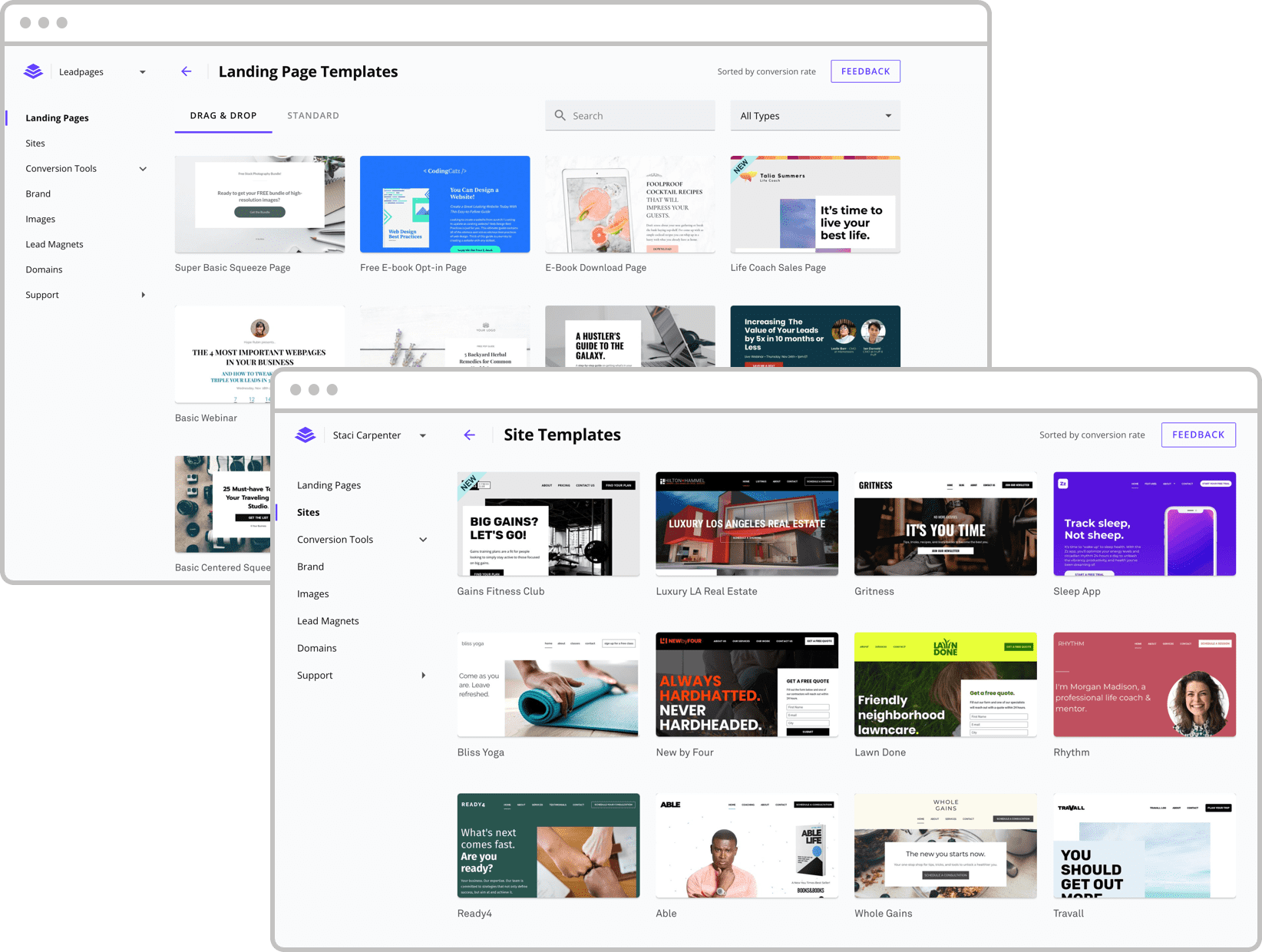
Our users benefit from:
Template availability and sorting:
Our gallery is sorted by conversion rate and clearly named to convey their value to users from the get-go. With over 200 free versatile and unique landing page templates and additional website templates, you can search from an abundance of options by industry or goal.
Additionally, each template is scientifically optimized for high conversion with clean, simple design; a single call-to-action above the fold; and a pop-up opt-in form. It allows users to better understand the features of each template.
Mobile responsive (right out of the box):
All content is mobile responsive, and displays optimally on devices of different sizes, be it a desktop, tablet, or mobile device. In fact, our multi-device preview is automatically generated, so no additional steps are necessary to ensure you’re hitting every type of device with the same impactful design. For even more customizability, there’s also device-specific display settings, which allows users to design specific sections as well as shows (or hides) them on certain devices.
Kajabi:
Kajabi lets you narrow down your objective by the following options:
- Creating an online course
- Growing your email list
- Creating a site for your business
- Hosting a community or membership group
The platform includes six Premier Framework website themes and eight legacy website themes, making your templates choices slightly limited as a user. There are also 22-page designs with options to customize your page based on the type of page. (Think: sales, video opt-in, home, coming soon)
As far as template searching goes, with Kajabi you’re unable to do a keyword search for templates. Additionally, you can’t search templates by keyword or industry, which could be quite frustrating and make it difficult to find a relevant theme. (Contrary to Leadpages, you can’t sort templates by conversion rate, either.)
Looking for mobile responsive templates? Kajabi lets you change the mobile version using a designated mobile or desktop section within the editor that appears on every template.
Verdict:
Given Leadpages’ sheer number of templates and advanced search options, we’re the clear winner.
The theme layout of Kajabi allows you to choose between six layout presets and customize elements from there. This aspect makes building a cohesive website a bit easier than within Leadpages, which, although website templates are available, is more targeted towards landing page design. Both platforms provide templates for entire websites as well as for landing pages, but Kajabi specializes in course templates. So, if you’re selling online courses or providing education online, Kajabi shines in this category.
We offer much more variety and quantity, as well as advanced search functions and categorization. And, as a bonus, our templates are already sorted by the highest conversion rate, so you don’t have to spend hours scouring all of your template options. Overall, our template dashboard is more intuitive to navigate and offers a greater variety of professional-looking landing page templates.
4 - Conversion tools: collect leads and close sales
Us:
Your ability to convert customers is our top priority, which is why we created our exclusive conversion toolkit. This toolkit helps you convert your hard-earned website traffic through:
- The Leadmeter, our nifty (and built-in) tool predicts how well your page will perform and tells you what to tweak before you publish it (as we mentioned above)
![]()
- Alert bars, which prompt user action, are publishable on any website or landing page
- Intuitive pop-up forms, captures the attention of visitors on any page to increase registrations, opt-ins, and even sales
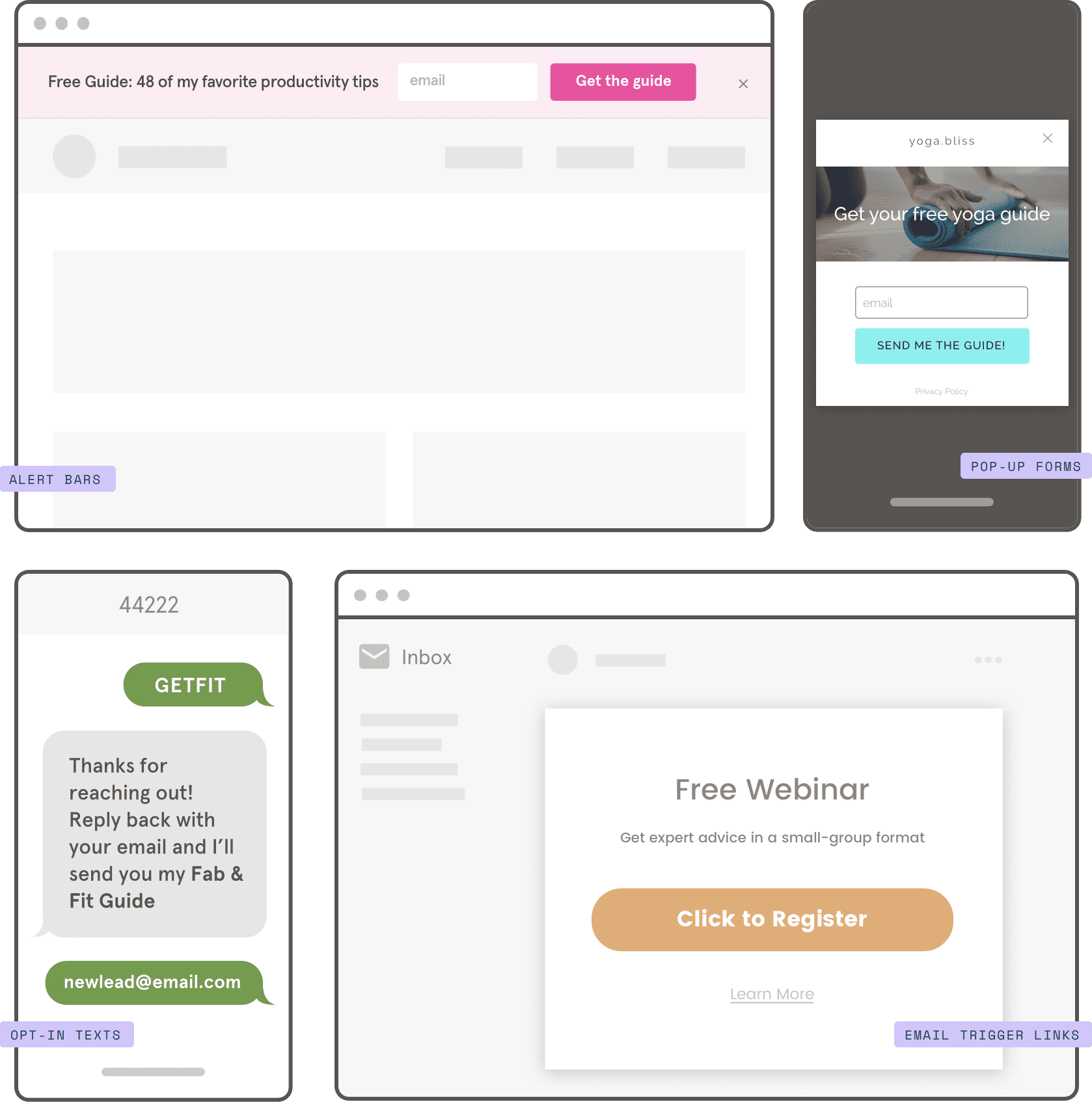
We also help move customers along in their journeys through count clicks and opt-ins as conversions, easy payment, shopping cart integrations through Stripe, and intuitive A/B testing.
We also help move customers along in their journeys through conversion tracking, intuitive A/B testing (available on Pro and Advanced plans), and easy payment integration through Stripe. This payment integration is super slick as it allows you to connect a (free) Stripe account to your Leadpages dashboard. Then, you can easily pull in the products and services you’d like to sell—all without touching a lick of code!
Kajabi:
Where Kajabi shines is its email builder. This is a unique feature, as it allows users to integrate email to their campaigns with ease. Kajabi also has campaign automation with custom triggers as well as the ability to tag customers based on behavior, so users can create unique use-cases for each consumer action. This platforms’ users can rest assured the top open rates for their email, as it has built-in email A/B testing to find the best email element combinations.
Beyond this, Kajabi offers a marketing pipeline builder to ensure its users are building a steady stream of clients. Similar to Leadpages, the platform hosts the ability for users to create exit pop-ups and two step opt-ins built into page layouts.
Verdict:
It’s a tie! Both have top-notch conversion abilities, and users can create pop-ups and deliver lead magnets through either service. Each shines in different ways...
Kajabi has built-in email funnel functions that are unmatched from many other conversion marketing platforms. Kajabi’s email marketing tools include pipeline builders that help users fill their customer sales pipeline with ease.
Where Leadpages shines is in our A/B testing for landing pages whereas Kajabi uses A/B testing for just email campaigns.
5 - Publishing options: flexibility & ease of publishing finished content
Us:
We offer a plethora of publishing options. In fact, each Leadpages account comes with free hosting on a custom subdomain (https://your-domain.lpages.co), so you can easily differentiate your pages from a crowd.
Our platform’s benefit is getting online quickly and easily without worrying about purchasing or configuring a domain, or hosting capabilities. In fact, users can also publish on a third-party domain you already own or opt to buy a Leadpages annual subscription and receive a free domain for one year (through Hover). Plus, every Leadpages account includes a plugin you can use to install your landing pages, pop-ups, and alert bars through Wordpress. In doing this, we make it easy for users because you can publish your page in dynamic HTML, which automatically updates when edits are published in Leadpages.
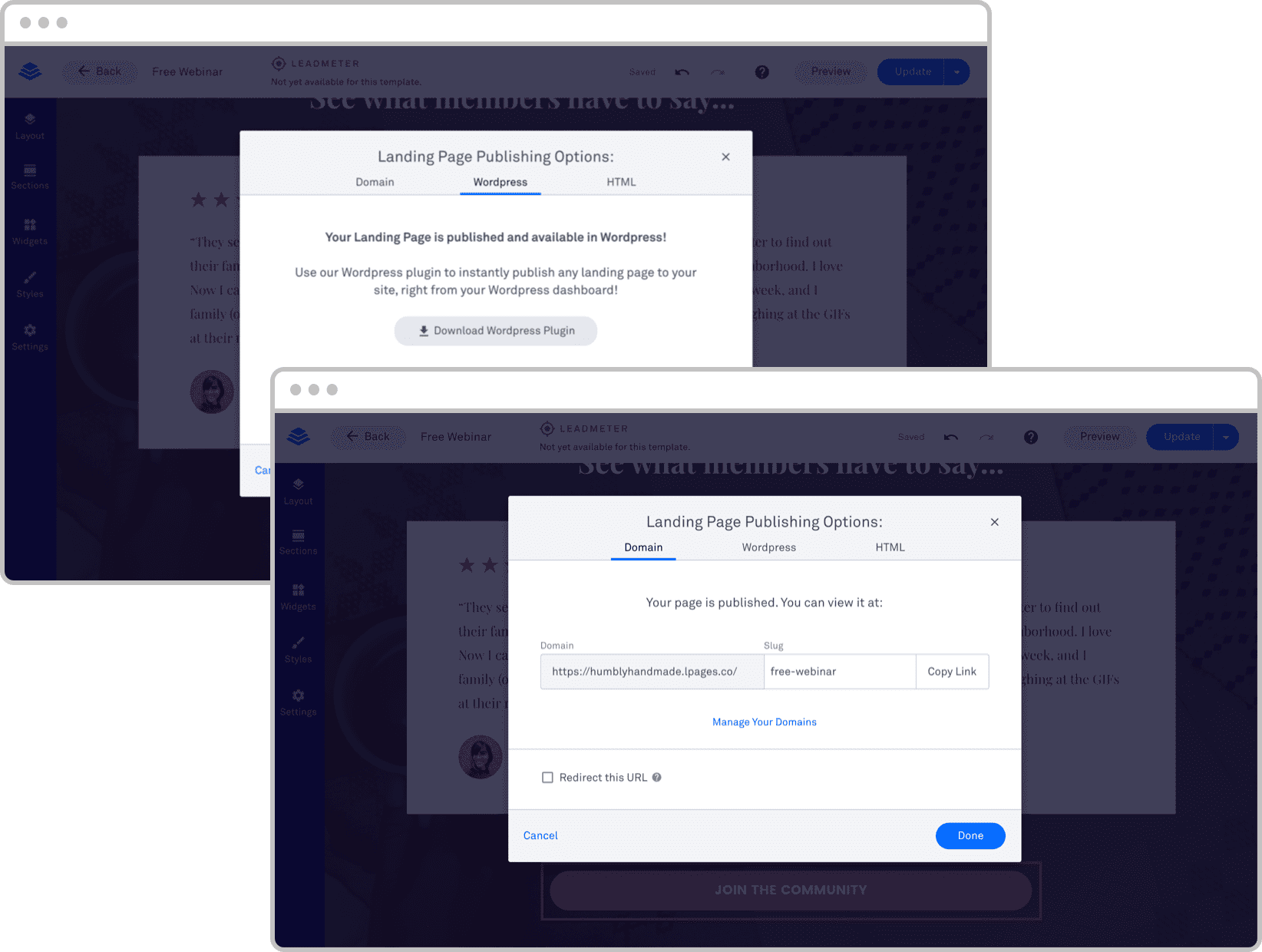
With our platform, you can also share landing page or website templates with your team or clients (at no additional cost) to maximize team visibility.
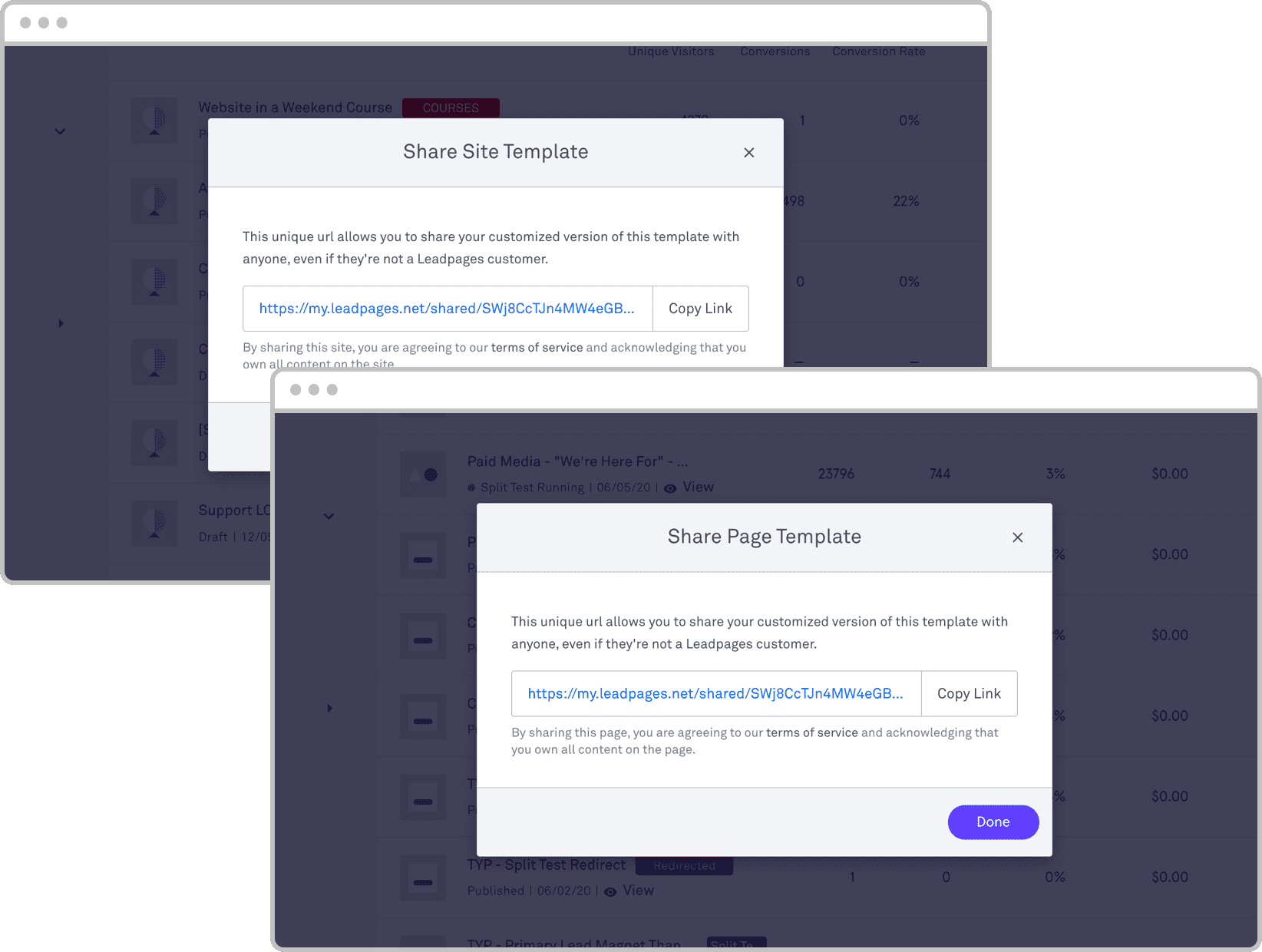
Kajabi:
Point blank, Kajabi is pretty similar to Leadpages in this category. Publishing is as easy as 1,2,3 with Kajabi. Why? The platform gives each user a free domain, or the option of connecting a custom domain. Users can also publish pages directly through Kajabi with a free domain or with your existing domain.
Verdict:
It’s a tie!
You can publish your site or landing pages easily with both of these platforms. With both platforms, you are offered a free domain as well as the ability to connect a custom domain.
6 - Get traffic: promote content after it's published
Us:
After you build your page, attracting web traffic requires promotion. Thus, it’s extra-important to choose a platform that helps you after you publish your landing or web page. Very few businesses “make it” without maintaining a healthy flow of traffic, leads, and sales. But, Leadpages is here to help.
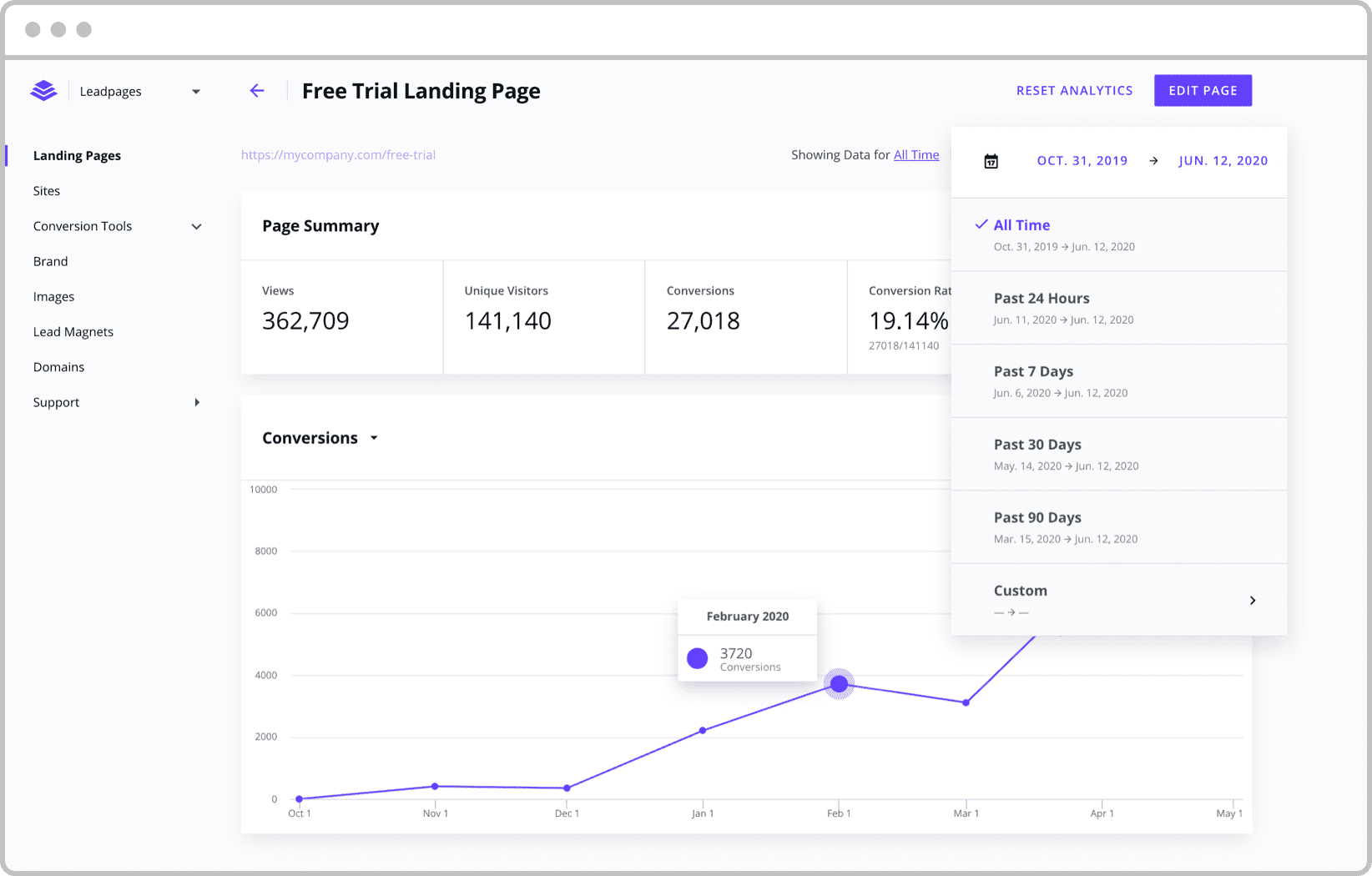
In fact, gaining and monitoring traffic is a cinch with Leadpages.
Why? First and foremost, you can leverage our streamlined analytics dashboard, real-time analytics, and zero limits on traffic and lead volume, meaning you’ll never hit ceilings or pay more for the traffic and leads you collect. Users have visibility into their earnings. In fact, you can see them in real-time using our checkout widget. In addition, our lightning-fast page load speeds of 2.4 seconds faster than average to make sure traffic is not bouncing away from your site and is ranking on Google.
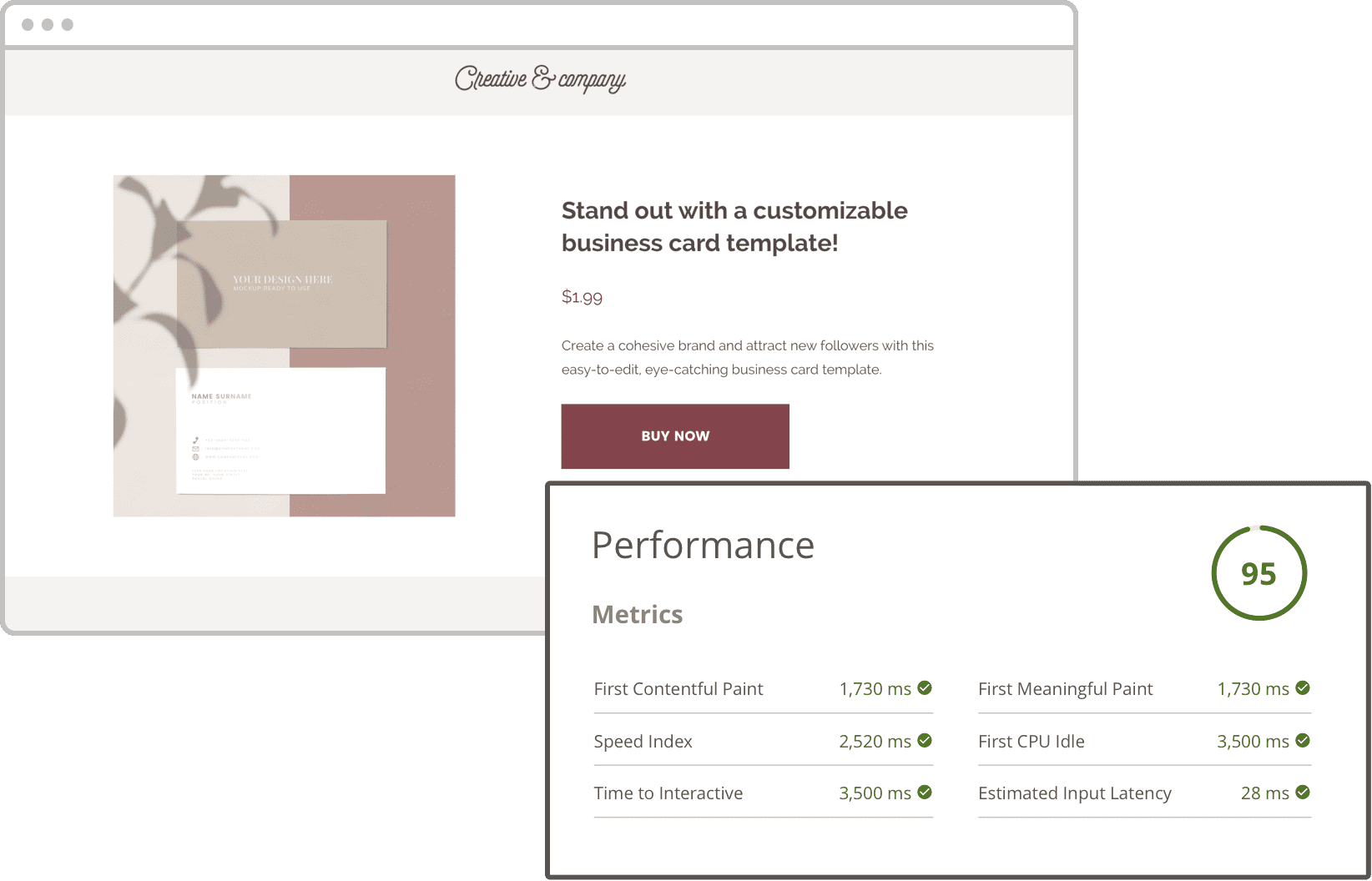
Another enticing feature is our Search engine optimization aid. Any Leadpages plan can use our SEO settings and previews. With this feature, users can set the meta-title, keywords, and meta-description of any page to up the chances of Google indexing your site at the top of search results.
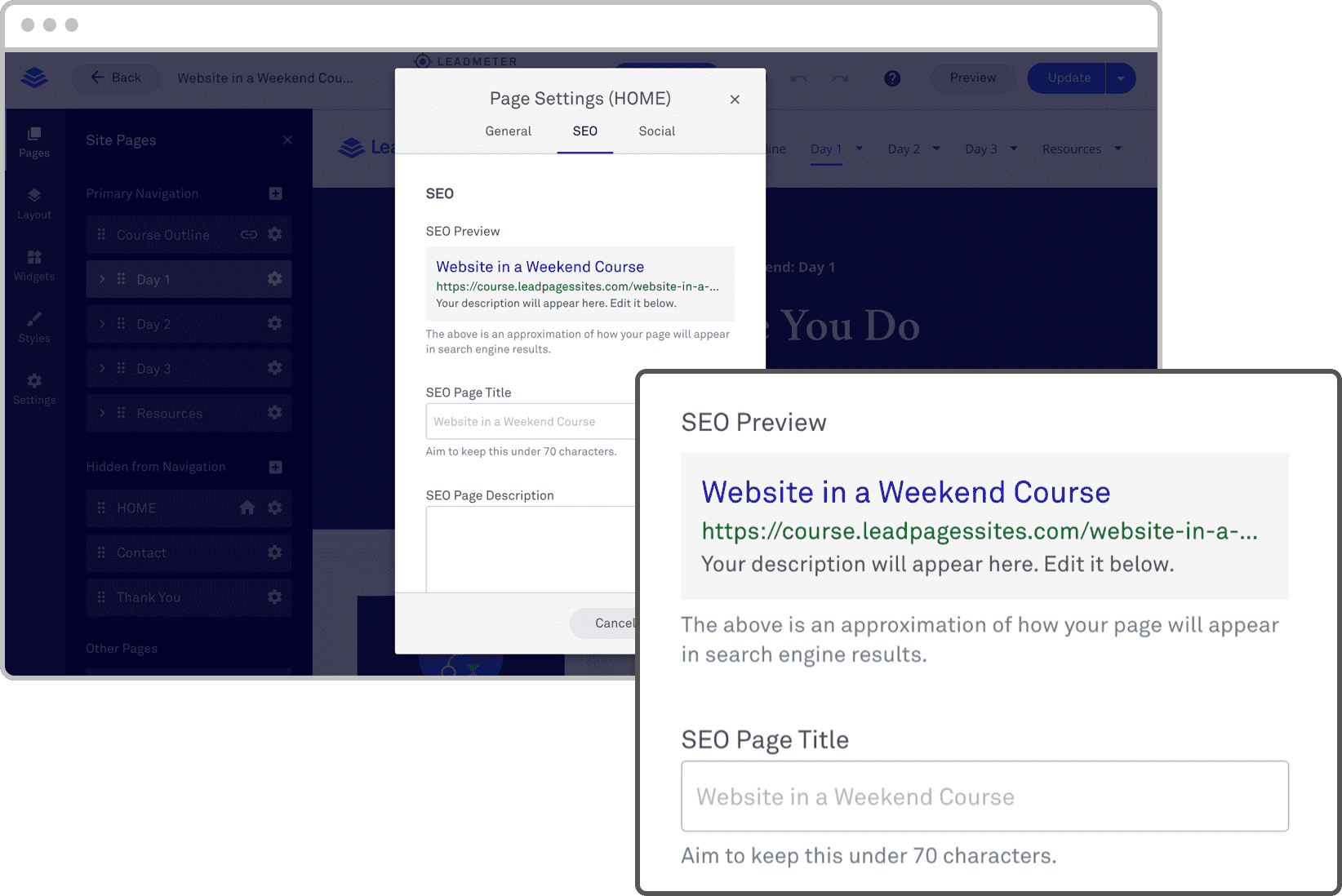
Kajabi:
Kajabi offers a real-time analytics dashboard to track every visitor’s action. It’s especially targeted for selling online courses, as it outlines net revenue, subscription metrics, opt-ins, offers sold. As well as lead profiles, which lets users customize information on each lead.
Verdict:
Again, in terms of offerings, it’s a tie.
Kajabi’s analytics dashboard is geared towards delivering online courses on a subscription basis. Leadpages gives a full picture of your page or web site’s analytics, insight into the views, unique views, conversions, and conversion rates.
Both platforms build SEO settings right into their homepage settings and integrate with third-party analytics, but only Leadpages guarantees unlimited leads and traffic.
Long story short, if you’re expecting it to rain leads, go with Leadpages as the platform doesn’t cap the number of leads. If you’re selling a subscription-based online course, however, you may want to choose Kajabi.
7 - Bang for your buck: value for money
Us:
So, what’s the investment in Leadpages look like? There are tiers to suit every budget. We offer standard, pro, and advanced plans; available for purchase by month or year. And no matter what plan you’re on—you get unlimited traffic, leads, and landing page publishing.
Looking for an extra helping hand? Our customer support team can be there for you via email, chat, and priority phone, and based on your plan level. The same goes for our exclusive marketing education training.
Kajabi:
Kajabi has a similar pricing model, charging its users per month or year. Here is a breakdown of its cost per month, based on plan tier. Kajabi is roughly three to four times more expensive than Leadpages.
With each plan, Kajabi University courses are available, as well as 24/7 chat support. Membership and affiliate programs are supported, too, making this a draw for those selling online courses.
Verdict:
In terms of the number of websites you can build, you will find much more room for growth with Leadpages. On Kajabi’s highest tiered plan you can only build 3 websites, whereas Leadpages allows for up to 50.
Kajabi has a higher price tag than most of Leadpages plans, which can be justified by their specialization in online course building and marketing pipeline features. They support you through creating your own education software essentially, which is great for educators or experts. Leadpages on the other hand drives home the conversion aspect, as they have a wider variety of built-in integrations, as well as Leadmeter, a built-in conversion optimizer, so you can find what works best for your business.
The final verdict
So, is the final winner Leadpages or Kajabi? The answer is, of course, depends on what you’re looking for:

